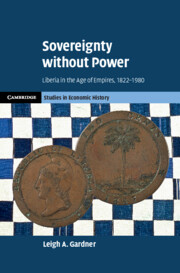Book contents
- Sovereignty without Power
- Cambridge Studies in Economic History
- Sovereignty without Power
- Copyright page
- Dedication
- Contents
- Figures
- Maps
- Tables
- Preface
- Acknowledgments
- 1 Reconstructing the Fragments
- Part I Foundations
- Part II The Art of Survival
- 4 Trade, Globalization, and Sovereignty
- 5 From Paper to Gold
- 6 The Costs of Foreign Capital
- 7 Financial Controls and Forced Labor
- Part III Sovereignty for Sale?
- Book part
- References
- Index
7 - Financial Controls and Forced Labor
from Part II - The Art of Survival
Published online by Cambridge University Press: 27 October 2022
- Sovereignty without Power
- Cambridge Studies in Economic History
- Sovereignty without Power
- Copyright page
- Dedication
- Contents
- Figures
- Maps
- Tables
- Preface
- Acknowledgments
- 1 Reconstructing the Fragments
- Part I Foundations
- Part II The Art of Survival
- 4 Trade, Globalization, and Sovereignty
- 5 From Paper to Gold
- 6 The Costs of Foreign Capital
- 7 Financial Controls and Forced Labor
- Part III Sovereignty for Sale?
- Book part
- References
- Index
Summary
While supersanctions may not have improved the terms of Liberia’s loans very much, they did have unanticipated impacts on the structure of domestic political institutions. This chapter examines these effects, and in doing so offers a new interpretation of one of the more infamous phases in Liberia’s economic history: the 1930 League of Nations investigation into forced labor, when an investigative commission established by the League found that Liberian government officials had engaged in the use and export of forced labor. Over the first decades of the twentieth century, foreign financial controls imposed on the Liberian government as a condition of borrowing expanded from control over customs revenue to include nearly all sources of cash revenue by 1927. This chapter documents the Liberian government’s efforts to develop alternative sources of revenue with which to pay an expanded administrative establishment during repeated periods of fiscal crisis, and their ultimate turn toward a decentralized system of in-kind taxation in the form of forced labor and seizures of goods. These practices led to both domestic political upheaval and international isolation, and the threat of a League of Nations mandate over Liberia. This chapter contributes to a growing understanding of the contributions of forced labor to African government budgets in this period, as well as to work on the impacts of supersanctions on domestic institutions.
- Type
- Chapter
- Information
- Sovereignty without PowerLiberia in the Age of Empires, 1822–1980, pp. 163 - 188Publisher: Cambridge University PressPrint publication year: 2022

